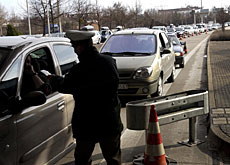
German border checks leave Swiss in a jam

Switzerland has called on Germany to explain why it has imposed stringent border checks, which have caused huge tailbacks on the Swiss side of the frontier.
Border officials believe the move may be designed to put pressure on Bern to wrap up a series of stalled bilateral treaties with the European Union.
“We’re surprised by these measures, their timing and the reasoning behind them,” Walter Pavel of the Federal Customs Office in Bern told swissinfo.
“The German border guards have been very relaxed in their controls until now.”
The Swiss finance minister, Hans-Rudolf Merz, said he would raise the issue with his German counterpart, Hans Eichel.
“We have to find out if there is something behind this,” Merz said. “Of course, I hope there isn’t.”
During an address to Swiss parliamentarians on Wednesday, the economics minister, Joseph Deiss, described the measure as an example of how EU member states wanted to demonstrate “that there is a difference between EU and non-EU countries”.
Deiss, who currently holds the rotating Swiss presidency, said there had been signs “for some time” that Switzerland’s relationship with Germany was becoming more problematic.
Tougher checks
Tougher checks on people and vehicles entering Germany from Switzerland began on Friday, provoking daily traffic jams several kilometres long on the Swiss side of the border.
One of the worst affected crossing points is in the Swiss city of Basel.
“We were told at very short notice that the German border police would reinforce their passport inspections,” said Patrick Gantenbein, a spokesman for Swiss border guards in Basel.
“The Germans are now checking every car leaving Switzerland.”
Cross-border crime
Thorsten Neuwirth of the Southern German Customs Office in Munich told swissinfo that the checks had been intensified to comply with the Schengen accord governing cross-border crime between EU and non-EU nations.
“The German federal border guards are carrying out these customs controls in line with the standards set out in the Schengen accord,” he said.
Neuwirth declined to say why checks were suddenly being stepped up now when the accord came into effect in 1995.
Border officials in eastern Switzerland speculate that it may be a means of turning up the heat on the Swiss government, which is currently locked in a tug of war with Brussels over nine bilateral treaties.
The government wants concessions from Brussels in return for joining the EU’s new tax regime. The deal would see a levy on EU residents’ savings in Swiss banks being paid to Brussels.
In return, Bern wants amendments to the Schengen accord. The Swiss are asking for an opt-out in the area of judicial cooperation to avoid compromising banking secrecy.
Pressure
“I think it’s a way of applying pressure on Switzerland,” Jacques Strahm, head of the border authorities in French-speaking Switzerland, told swissinfo.
“It could be linked to the bilateral treaties, to show [the Swiss] what happens when strict rules are applied.”
Patrick Gantenbein of the Basel customs authorities added: “It’s already become a political matter.”
On Tuesday EU finance ministers meeting in Brussels again urged Switzerland to stop dragging its feet and sign the savings tax agreement before the end of June.
Hans Eichel, Germany’s finance minister, stopped short of threatening sanctions but made it clear that time was running out for the Swiss.
“I assume that no country in Europe wants to make its living in part by making itself into a hideout for tax-evaders from other countries,” he said. “I assume this also of Switzerland.”
Solo operator
It is also still not clear why Germany is acting alone. Austria, France and Italy, Switzerland’s other EU neighbours, have not imposed tougher border checks.
“The Italian guards haven’t stepped up their controls and there’s nothing planned for the coming days,” confirmed Clemente Milani, spokesman for the border guard authority in Italian-speaking Switzerland.
“It’s an internal German matter.”
The German authorities have pledged to try to speed up checks to ease traffic congestion.
“They might make some changes. I hope we can soon find a solution to this unhappy situation,” Gantenbein said.
The move by Germany to impose stricter checks at the Swiss border comes less than a month after the EU unexpectedly announced plans to levy a customs tax on re-exports from Switzerland to its member states.
Two weeks ago the EU agreed to delay the introduction of the tax until June 1 after the Swiss authorities lodged an official protest in Brussels.
swissinfo, Vanessa Mock
Germany imposed tight checks on people and vehicles leaving Switzerland on Friday.
Germany says the move is in line with the standards set out by the EU’s Schengen accord governing cross-border crime.
Switzerland has not yet signed the accord, which first came into effect in 1995.
There are 90 border points betweeen Switzerland and Germany.
The new measures have caused daily traffic jams up to 13 kilometres long.
German officials have pledged to find ways of reducing the delays.

In compliance with the JTI standards
More: SWI swissinfo.ch certified by the Journalism Trust Initiative




























You can find an overview of ongoing debates with our journalists here . Please join us!
If you want to start a conversation about a topic raised in this article or want to report factual errors, email us at english@swissinfo.ch.